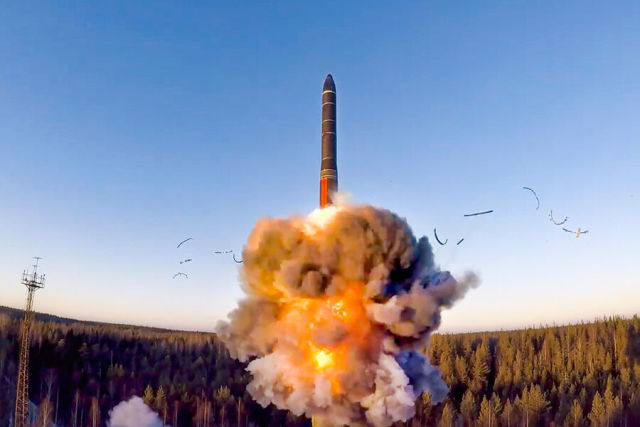NATO magazine published an article about the possible use of nuclear weapons by Russia
A NATO-owned magazine published an article by an ex-Pentagon official about Russia's possible use of tactical nuclear weapons in a "hypothetical war" with the North Atlantic Alliance. The author believes that Moscow can use it to avoid defeat or achieve more favorable conditions for the end of the conflict. The Russian Federation has repeatedly called for an end to "nuclear" speculation.
Former senior Pentagon official Gregory Weaver did not rule out the use of nuclear weapons by Russia in the event of a war with the North Atlantic Alliance. The article under his authorship was published in the NATO Review magazine, which belongs to NATO.
The description of the publication states that the publications in the journal do not represent the official position or policy of the alliance or the governments of the member countries, and the opinions expressed by the authors of the materials "are their own."
Weaver suggests that the fighting in Ukraine could lead "to an increase in Russia's dependence on nuclear weapons." At the same time, he expects that the current conflict will end "without Russia using nuclear weapons," but this will not mean that Moscow will not resort to using such weapons against the alliance "under other circumstances."
According to the author, the alliance's refusal to intervene militarily in the conflict in Ukraine may give Moscow the impression that NATO is vulnerable to "threats" of the use of nuclear weapons. In addition, Weaver believes that Russia may have the opportunity to attack NATO if the United States gets involved in a major conflict - for example, in the war against China over Taiwan.
The American ex-official points to two potential scenarios of Moscow's use of nuclear weapons.
In the first case, in his opinion, the Russian Federation will focus on the "limited use of nuclear weapons in the theater of military operations" for forced escalation in order to achieve an end to the war on acceptable terms.
In the second case, Weaver expects Moscow to conduct "large-scale nuclear operations" on the battlefield to avoid defeat. This option, according to the author of the article, is possible if the Russian authorities see NATO as a threat to "the very existence of the Russian state." In both cases, we are talking about the use of tactical nuclear weapons.
"Thus, deterring Russia's use of nuclear weapons against NATO will remain an urgent task even after the end of the war in Ukraine," the former official emphasizes.
Tips for NATO
According to Weaver, the countries of the North Atlantic Alliance need to develop a strategy that will show Russia that the limited use of nuclear weapons will not lead to a resolution of the conflict on Moscow's terms and may provoke its uncontrolled escalation.
"Strategic nuclear forces are not flexible and timely enough to convince the Russian leadership that NATO is fully prepared to resist the limited use of nuclear weapons," Weaver argues.
He also calls on the alliance to modernize dual-use fighter aircraft and the division of labor: according to the ex-official, European countries should be provided with more conventional weapons, and the United States should provide additional nuclear capabilities in the theater of operations.
Russia's position
Moscow has repeatedly urged Western countries not to speculate on the use of nuclear weapons. Thus, the head of the Russian delegation to the arms control talks in Vienna, Konstantin Gavrilov, said that Moscow had never threatened the world with nuclear weapons and called discussions about its potential use "very dangerous games."
Russian President Vladimir Putin in December 2022 noted that the threat of nuclear war is "growing", but the Russian Federation is not going to strike first and considers such weapons "precisely as protection."
Russian Foreign Minister Sergei Lavrov also called for an end to "artificially warming up" the topic of the potential use of nuclear weapons. He stressed that Moscow is not considering the possibility of its use in Ukraine.
According to Russia's nuclear doctrine, nuclear weapons are considered "exclusively as a means of deterrence, the use of which is an extreme and forced measure." It can be used in response to a nuclear strike on the Russian Federation or allies, as well as in the case of an attack on Russia using conventional weapons, "when the very existence of the state is threatened."
Semyon Sleepy

